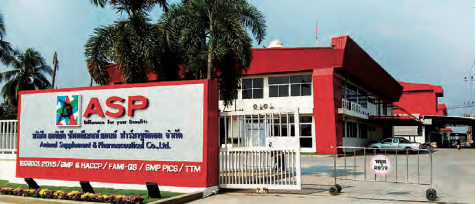Animal Supplement & Pharmaceutical co ltd (ASp), a member of Vet Products Group, is using total quality management (TQM) principles to improve business efficiency and hone long-term competitiveness as it pursues its goal of becoming a top regional supplier of feed additives and veterinary medicines.
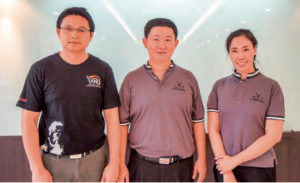
Dr Winai Chaisitsanguan (centred) together with Dr Pattapong Khonkhayan, product and marketing manager (left) and Taraporn Jeangjamjit, senior feed addtives quality control manager
Dr Winai Chaisitsanguan, assistant vice-president, said the company has made major progress in its quality standards this year. So far in 2017, it has gained FAMI-QS, ISO 9001:2015, GMP, HACCP and Pharmaceutical Inspection Co-operation Scheme (PIC/S) accreditation.
The company’s QC lab is preparing for ISO17025 and expects the process to be completed by Q4, 2018.
ASP has been able to sustain business growth, even though demand for veterinary drugs and antibiotics is subsiding along with profit margins.
Antibiotic use is now more regulated than ever. Prescriptions must be issued by certified veterinarians and strict withdrawal periods observed due to increasing awareness of antibiotic resistance issues, said Dr Winai.
Although antibiotics are not totally banned, there are fewer choices. For example, shared-class antibiotics are now withheld from the livestock sector.
To maintain market share amid changing times, Vet Products Group Research & Innovation Center (VRI), in collaboration with with ASP, is researching alternatives to antibiotics to tackle diseases and reduce antibiotic resistance.
To further its goals, ASP’s QC department will deploy additional instruments and develop greater analytical capacity.
Veterinary medicine production
The building and work ow protocols were designed with good manufacturing practices in mind. PIC/S certification means that the building, air handling system and production procedures are comparable to those used in human pharmaceutical manufacturing.
Temperature, relative humidity and ventilation of the entire building is controlled by an HVAC system to maintain pristine air quality suitable for pharmaceutical production.
Air quality, temperature, humidity and ventilation are critically important for quality control and the comfort of workers in the plant.
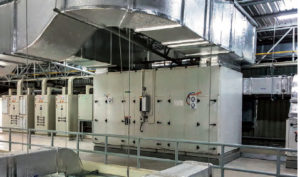
Air handling unit.
Medicines are produced in a class D clean room in line with European Union PIC/S standards.
Laminated sandwich panel walls with a high insulating value were used for the entire building because they are easy to clean and dust free.
Staff entering or leaving the working area pass through an airlock. They are required to put on protective gear, coveralls, and shoe coverings.
The clean room maintains positive air pressure at 0.05 bar. Fresh air is filtered upon entry to exclude dust, and the air inside the building is recirculated through a high efficiency particulate air (HEPA) filter.
ASP manufactures low concentration doses of colistin, tilmicosin, tiamulin, tylosin, lincomycin, doxycycline and sulfonamide in line with new legislation governing mixability.
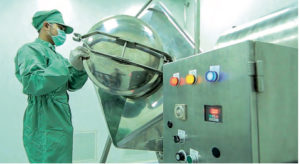
Cubic mixer
It uses both ribbon and cubic mixers for preparing the ingredients. Mixing CV is below 5% on a 500 kg batch.
Active ingredients and expedients are sieved to exclude particles larger than 20 US mesh (850 micron).
ASP has taken up a Certified By Test (CBT) project to benchmark its products with competitors. CBT measures product potency, stability in normal pH, acidity and high temperatures to ensure peak efficacy.
VRI’s team has been researching new technology that delivers a drug to a specific site. The latest development on this front, a “new” tilmicosin, uses nanoparticle technology. VRI recently won an international award in Poland for its ground-breaking work on the product.
Developing new ways to optimize the stability and bioavailability of drugs is a constant challenge. Besides pharmacodynamics – the biochemical and physiologic effects of drugs – formulators also need to understand production aspects where particle size, bulk density, mixability, and suitable expedients are all equally important in making a good drug.
For stability testing, the products are stored under conditions that accelerate degradation. For testing, a temperature of 40°C and 75% RH for six months is used, even though products are normally stored at a room temperature of around 30°C and 75% RH.
Retained samples are kept for 4-5 years. QC typically keeps samples for an additional two years beyond the regular expiry date which is 2-3 years, Dr Winai added.
Products are tested comprehensively in labs and on animals before being scaled up for commercial production. Tests are conducted internally at the QC lab and some are routinely sent to 3rd party labs.
In Thailand, product registration takes around two years. Also, manufacturers must prove that generic products are as effective as the original products.
Active pharmaceutical ingredients (API) used in manufacturing are subject to rigorous testing that shows they conform to United States, European and British pharmacopeia quality standards.
Purified water that has been tested for microbes is used for rinsing the equipment after it has been thoroughly cleaned.
Water soluble products are tested for solubility under various conditions, especially hard water.
The nished products are packed in two, 10 and 20 kg bags for feed mill customers. The products are quarantined until they have been tested and approved by the quality assurance team prior to delivery.
Vitamin, trace mineral and feed additive premixes
ASP supplies blends of protein and concentrated energy, also known as base mixes, that may also contain vitamins and minerals as well as enzyme products. Also, vitamin-mineral premixes can be custom made for small feed mills and farms that make their own feed.
The plant has three lines each with a 1-tonne ribbon mixer.
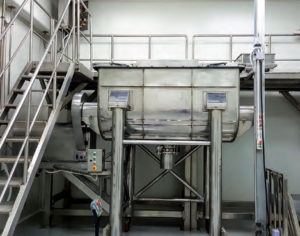
Mixer in ASP veterinary plant
The average mixing time is 10 minutes/batch, with less than 5% coefficient of variability (CV). Mixing uniformity is routinely tested every quarter because CV reflects mixer efficiency and mixture uniformity.
Ingredients are selected for effectiveness, stability and safety. Suppliers must be FAMI-QS accredited or FAMI-QS equivalent and allow an audit by ASP on site.
A mock crisis exercise is conducted annually to trace product whereabouts. Lot numbers contain complete product information all the way back to the raw materials used in each batch. All information needed for swift traceback is stored in a database.
Customer complaints are investigated promptly. A reply is given within three working days and the following investigation of the underlying causes of each complaint must be completed within one week.
Particle size of raw materials is considered a critical control point because small differences in size or density results in segregation in dry mixing. Ingredients are sieved to avoid problems.
Micro and minor ingredients are precisely weighed and mixed in a cubic mixer. Carriers are then added before the batch is mixed again in a one-tonne mixer.
Carriers are tested and selected based on product suitability, and chosen based on physical characteristics, type of active ingredient and functionality. Commonly used carriers are de-oiled rice husks sprayed with mineral oil to minimize static charge and lime (calcium carbonate). Both retain ne powders and liquids well.
Production activities are well planned to minimize the need for change over and the risk of cross contamination. The company’s work processes and control systems ensure quality consistency.
To prevent contamination, the production line is ushed with carriers. The cleaning process must be validated prior to each new production run.
Anti-caking agents and antioxidants are used to ensure stability, especially in formulas containing chlorine chloride, manganese and vitamin B2. Antioxidants are used in line with the US Food and Drug Administration’s permissible limit which is below 150 ppm.
Enterprise resource planning software is used for production forecasting, inventory management, billing and accounting.
Also, flowability is regularly tested. The accepted angle of repose is between 20-35 degrees, depending on the carriers used.
Wastewater from cleaning, hazardous waste from the QC lab and dust collected by the HVAC system is sent to chemical waste disposal companies.
The company plans to implement total quality management for the entire organization by 2021.
This year, ASP hosted a number of open-house activities that were visited by many domestic and oversea visitors. Survey results have reported very high satisfaction rates.
Dr Winai added that ASP is actively recruiting distributors in countries where currently no agents have been appointed.

